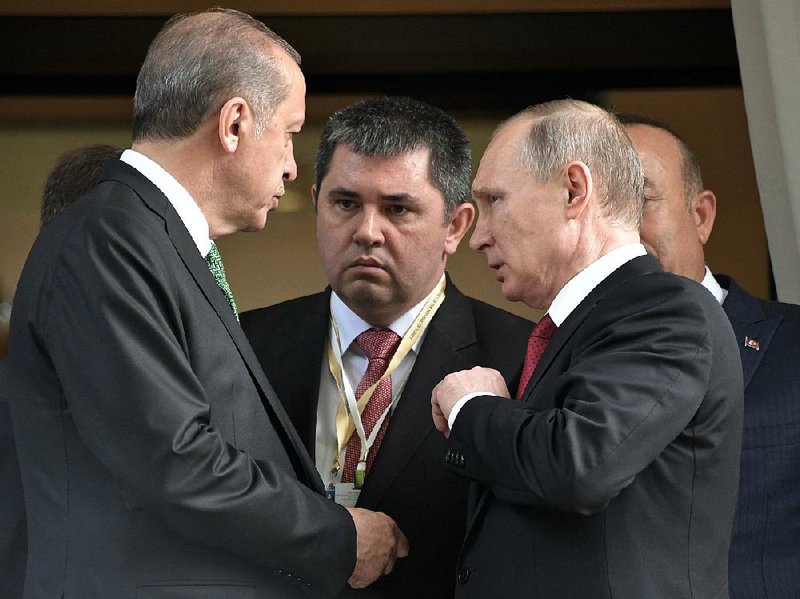BEIRUT -- Russia, Iran and Turkey agreed to establish "de-escalation zones" in Syria, signing on to a Russian plan under which President Bashar Assad's air force would halt flights over designated areas across the war-torn country.
The agreement, which a Russian delegate said would go into effect Saturday, is the latest attempt to reduce violence in the Arab country. But the full details of the proposal were not made available, and prospects for its success appeared bleak.
As officials from the three countries that back rival sides in the conflict signed the agreement at Syrian peace talks in Kazakhstan on Thursday, some members of the Syrian opposition delegation shouted in protest and walked out of the conference room in Astana, the Kazakh capital.
The opposition is protesting Iran's participation at the conference and role as a guarantor of the agreement, accusing it of fueling the sectarian nature of the conflict that has killed some 400,000 people and displaced half the country's population.
"Iran is a country that is killing the Syrian people, and the killer cannot be the rescuer," said Abu Osama Golani, a rebel commander who attended the gathering in Astana.
The walkout and the comments underscore the difficulties of implementing such a deal. The Syrian government has said that although it will abide by the agreement, it would continue fighting "terrorism" wherever it exists, parlance for most armed rebel groups fighting government troops.
A previous cease-fire agreement signed Dec. 30 in Astana helped reduce overall violence for several weeks but eventually collapsed. Other attempts at a cease-fire in Syria have all ended in failure.
Sponsors of the deal hope that safe zones would bring relief for hundreds of thousands of Syrian civilians and encourage refugees to return. But officials have expressed skepticism, stressing that safe zones have not had an encouraging track record.
Asked earlier this year to comment on the idea of safe zones after it was raised by President Donald Trump, U.N. Secretary-General Antonio Guterres pointed to examples such as Srebrenica, a U.N.-protected enclave in the Bosnian War where 8,000 Muslim men and boys were massacred in 1995.
However, U.N. Syria envoy Staffan de Mistura described Thursday's agreement as a "step in the right direction," expressing hope that the deal would boost U.N.-backed Syria peace talks in Geneva.
De Mistura said details of the Astana agreement would become clearer in the next two weeks, adding that the United Nations was "very supportive" of the deal.
U.S. State Department spokesman Heather Nauert said the United States has "reason to be cautious" about the chances for success of the deal, though it appreciates the efforts by Russia and Turkey to help lower violence in Syria. She added that the U.S. has concerns, including about Iran's "guarantor" role in the Kazakhstan deal.
"Iran's activities in Syria have only contributed to the violence, not stopped it, and Iran's unquestioning support for the Assad regime has perpetuated the misery of ordinary Syrians," she said.
The U.S. was represented at the talks in Kazakhstan, though Nauert said it was neither a "direct participant" nor a party to the agreement.
Along with Trump, the presidents of Russia and Turkey have recently supported the idea of creating safe zones in Syria.
Meeting Wednesday in the Russian resort town of Sochi, Recep Tayyip Erdogan and Vladimir Putin expressed hope the Syrian government and rebels would adopt the latest proposal to "de-escalate" the conflict.
Putin said Russian and Syrian government jets would halt flights over the specified zones if all sides respect the cease-fire.
The Kazakhstan agreement calls for delineating zones where front lines between the Syrian government forces and the rebels would be frozen and fighting halted. The zones include the provinces of Idlib, areas north of Homs, the eastern Ghouta suburbs outside Damascus, and an area in the south of the country, according to a statement.
Turkey's Foreign Ministry suggested the scope was wider and would include the whole of Idlib province; parts of Latakia, Aleppo and Hama provinces; parts of Homs province; parts of Damascus and the East Ghouta region; and parts of the southern Daraa and Quneitra provinces.
It was not clear how a cease-fire over such a broad and logistically complicated area would be achieved, or whether international observers would be sent to Syria to monitor its implementation.
The head of Russia's delegation at the Kazakhstan talks, Alexander Lavrentyev, said the Syrian government would abide by the agreement unless rebels inside those areas stage attacks.
"As of the sixth of this month all military operations will be ceased," the Russian official told journalists in Astana. "All Syrian flights over these areas will cease."
Information for this article was contributed by Sarah El Deeb, Zeynep Bilginsoy and Josh Lederman of The Associated Press.
A Section on 05/05/2017
